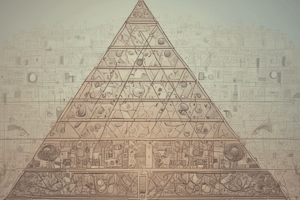Podcast
Questions and Answers
What is a variable in Boolean algebra?
What is a variable in Boolean algebra?
- A number representing a logical quantity
- A symbol used to represent a logical quantity (correct)
- A type of operation
- None of the above
What is the complement of a variable?
What is the complement of a variable?
The inverse of a variable, indicated by a bar (overbar) over the variable.
What does Boolean addition represent?
What does Boolean addition represent?
- NOT operation
- AND operation
- OR operation (correct)
- XOR operation
What is Boolean multiplication equivalent to?
What is Boolean multiplication equivalent to?
The commutative law states that A + B = ___ + A.
The commutative law states that A + B = ___ + A.
Match the following laws with their descriptions:
Match the following laws with their descriptions:
What does the associative law of addition state?
What does the associative law of addition state?
State the distributive law in Boolean algebra.
State the distributive law in Boolean algebra.
Flashcards are hidden until you start studying
Study Notes
Key Concepts of Boolean Algebra
- Variable: A symbol that represents a logical quantity, essential in Boolean expressions.
- Complement: The inverse of a variable, denoted by an overbar, representing the opposite truth value.
- Boolean Addition: Functions as the OR operation, combining values to achieve a true outcome if any variable is true.
- Boolean Multiplication: Represents the AND operation, where the result is true only if all involved variables are true.
Commutative and Associative Laws
-
Commutative Laws:
- For addition (OR operation): A + B = B + A, demonstrating order independence in ORing variables.
- For multiplication (AND operation): A . B = B . A, highlighting that the order of ANDing does not affect the outcome.
-
Associative Laws:
- For addition: A + (B + C) = (A + B) + C, indicating grouping does not affect the result when ORing.
- For multiplication: A(BC) = (AB)C, showing that grouping in ANDing does not influence the final result.
Distributive Law
- Distributive Law: Expressed as A(B + C) = AB + AC. This states that combining OR and AND operations follows a distributive pattern, allowing for simplification of expressions involving multiple variables.
Fundamental Laws of Boolean Algebra
- Core Laws:
- Commutative Laws (for addition and multiplication)
- Associative Laws (for addition and multiplication)
- Distributive Law, forming the foundation for simplifying and manipulating Boolean expressions.
Studying That Suits You
Use AI to generate personalized quizzes and flashcards to suit your learning preferences.




